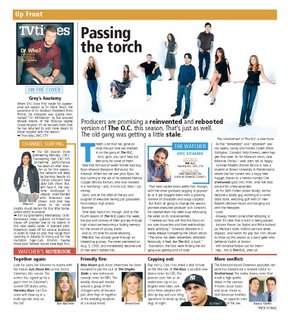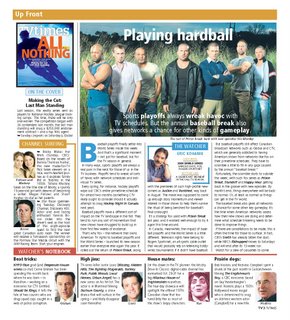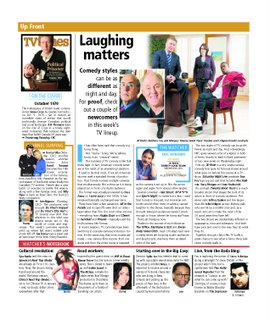ON SCREEN:
THE O.C.
THURSDAYS; FOX, CTV
BOTTOM LINE: TIME MARCHES ON, EVEN IN ORANGE COUNTY.
Passing The Torch
Producers are promising a reinvented and rebooted version of The O.C. this season. That’s just as well. The old gang was getting a little stale.
By Eric Kohanik
There’s a lot that has gone on since the last time we checkedin on the gang at The O.C.
And, gosh, you can’t help but feel sorry for some of them.
Take that fish-out-of-water former bad boy, Ryan Atwood (Benjamin McKenzie), for instance. When last we saw poor Ryan, he was rushing to the aid of his beloved Marissa Cooper (Mischa Barton), who was involved in a horrifying – and, it turns out, fatal – car mishap.
Gosh, and all this after all the joy and laughter of everyone having just graduated from Harbor high school.
Bummer.
Time does march on, though. And as the fourth season of The O.C. opens this week, the joys and sorrows of their journey through high school are becoming a fading memory for the crowd of young adults.
And so, it’s time for some retooling.
The O.C. has actually gone through an interesting journey. The series premiered on Aug. 5, 2003, and immediately became one of that year’s hottest hits.
That heat cooled down pretty fast, though, with the show gradually sagging in popularity as it got bogged down with a growing number of characters and soapy subplots.
But that’s all going to change this season, promises executive producer Josh Schwartz. His creative team has been busy refocusing the series on its core ensemble.
“I believe our fans will find this focus on our core characters and their relationships really satisfying,” Schwartz declared in a media release trumpeting the show’s return. “The show has been reinvented; rebooted. Personally, it feels like The O.C. is back.”
Translation: the fans were finding the old gang was getting kind of stale.
As the “reinvented” and “rebooted” season opens, Sandy and Kirsten Cohen (Peter Gallagher, Canada’s Kelly Rowan), seem happier than ever. As for Marissa’s mom, Julie(Melinda Clarke) – well, she’s not so happy.
Summer Roberts (Rachel Bilson) is now a student at Brown University in Rhode Island, where she has turned into a loopy tree-hugger, thanks to a mentor named Ché (Everwood grad Chris Pratt, who will stick around for a few episodes).
As for Seth Cohen (Adam Brody), he has become a lonely guy, working at a comic-book store, watching golf with Dr. Neil Roberts (Michael Nouri) and hanging out with the Newpsies.
Loser.
Anyway, there’s some other retooling in store. It’s clear that a torch is being passed.
Autumn Reeser (as Taylor) and Willa Holland (as Marissa’s sister, Kaitlin) are now series regulars. And watch for pop star Chris Brown to show up this season as a band geek who befriends Kaitlin at Harbor.
Will romance follow suit for them?
Hey…this is The O.C., after all.




